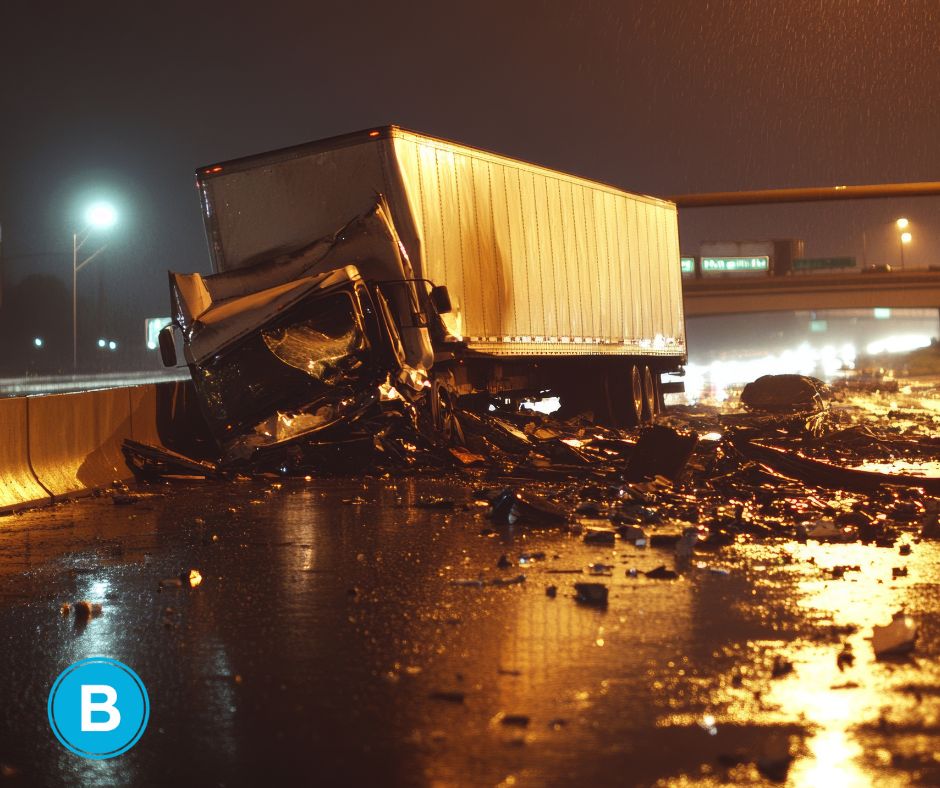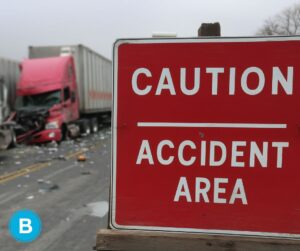
Traveling near commercial vehicles and semi trucks is part of everyday life on highways across America. These massive vehicles are essential to our economy, but they pose unique risks to other drivers. Some of the most serious, yet often overlooked, dangers are secondary crashes with trucks. A Tesla driver on Florida’s turnpike in Port St. Lucie unfortunately experienced this firsthand on Tuesday, April 2nd. At 11:25 PM, a semi-truck pulling a tandem trailer collided with a concrete barrier, lost control, and hit the nearby Tesla. The truck spilled over 100 gallons of fuel onto the highway, the semi-driver died in the accident, and the Tesla driver experienced serious injuries. This is a prime example of the dangers of secondary accidents with commercial vehicles. We see these often as injury attorneys here in the West Palm area.
A secondary crash happens when an initial collision or incident leads to another accident. When large trucks are involved, the results can be devastating. Understanding the causes of semi-truck accidents and how to protect yourself can make a critical difference in keeping you and your loved ones safe on the road.
Why are secondary crashes with trucks so dangerous?
Secondary crashes with trucks are often more dangerous than the original accident for several reasons:
Size and momentum
Commercial trucks can weigh up to 80,000 pounds fully loaded. When they are involved in a crash, the force they exert on other vehicles is enormous, leading to severe damage, serious injuries, and in some cases, fatalities. Additionally, their weight makes it harder for them to slow or stop, making a secondary crash more likely.
Chain Reactions cause many secondary crashes with trucks
A crash involving a truck can block multiple lanes or spill cargo (or fuel – see above) across the roadway, causing confusion and sudden stops among other drivers. These are prime conditions for secondary collisions.
Reduced visibility
After an initial accident, smoke, debris, or the physical positioning of the affected truck can limit visibility for approaching vehicles. This increases the chances of other drivers hitting the original vehicle(s) damaged in the crash.
Delayed emergency response
Clearing the scene of a serious truck accident takes more time and effort than a minor fender-bender. Because of the amount of debris and scale of the crash, it often takes police longer to reach the scene, take control, and begin safely directing oncoming traffic. Furthermore, it takes cleanup crews longer to clear the road and remove debris that can cause secondary accidents.
When discussing secondary crashes with trucks, it’s crucial to address another aspect of these accidents: what causes the original collision? Semi truck accidents are increasingly common, and we must understand why they occur if we want to protect other drivers.
What are the most common causes of semi-truck accidents?
While each accident is unique, there are some commonalities among the majority of commercial vehicle accidents. We most often see:
- Driver fatigue – long hours on the road cause slower reaction times, poor decision-making, and falling asleep at the wheel
- Mechanical failures – brake issues, tire blowouts, and other mechanical failures can cause a truck driver to lose control, especially at high speeds on the highway
- Improper loading of cargo – cargo that is poorly balanced or unsecured can shift during transport. This can cause a driver to lose control, or can cause the truck to roll over or jackknife.
- Distracted driving—Just like passenger vehicle drivers, truckers can become distracted behind the wheel. Mobile devices or eating while driving are most often to blame.
- Poor weather conditions – rain, wind, and fog can lead to collisions with road debris, concrete barriers, or even other vehicles
- Reckless driving – speeding, aggressive behavior, or driving under the influence of substances is dangerous, and regularly contributes to secondary crashes with trucks.

Stay vigilant in high-risk areas to avoid secondary crashes!
Knowing why semi-truck crashes occur is the first step to taking measures that keep you and your passengers safe. At Brooks Law Group, our top tips to prevent collisions with commercial vehicles are:
- Maintain safe following distances, especially in poor weather conditions. If you can’t see the truck’s mirrors, the driver can’t see you! Remember, if a crash occurs, more space gives you more time to react and avoid a secondary collision.
- Avoid blind spots. Spend as little time as possible in the “no zones” when driving near semi-trucks. If they see an accident threat, they may swerve to avoid debris or another vehicle. Being in their blind spot puts YOU in the danger zone.
- Stay alert! High-risk scenarios like construction zones, heavy traffic, or current accident scenes are prime places for secondary crashes with trucks to occur. By being extra cautious, you can respond to other drivers accordingly when driving in these areas.
- Know what to do in a crash. If you are in or near an accident involving a truck, slow down immediately, turn on your hazard lights, and look for an escape route. Staying aware of your surroundings can prevent you from becoming part of a secondary crash.
Brooks Law Group stands behind you after a truck accident.
Secondary crashes with trucks can happen in the blink of an eye, and their consequences are often catastrophic. Few understand this like the team at Brooks Law Group. We’ve worked with countless individuals impacted by accidents on Florida’s roads, and we specialize in representing those affected by semi-trucks and large-scale commercial vehicles. We battle for the justice and compensation you deserve for your medical costs, suffering, and damages, holding insurance providers and trucking companies accountable. We know your rights, we know what you deserve, and we make sure you get it!
Call us today to schedule your free consultation at one of our conveniently located offices. We serve a long list of cities throughout the state of Florida. You’re not just another number at Brooks Law Group, you’re a neighbor. If you’ve been injured in a truck accident, Look to Brooks!













